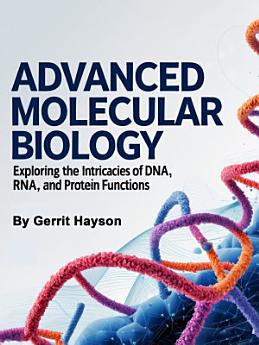Advanced Molecular Biology: Exploring the Intricacies of DNA, RNA, and Protein Functions
About this ebook
The discovery of DNA's structure in 1953 by James Watson and Francis Crick, building upon the crucial X-ray crystallography work of Rosalind Franklin, marked a turning point in our understanding of heredity and cellular function. This breakthrough revealed that DNA consists of two antiparallel strands wound around each other in a right-handed double helix, with the famous base pairs adenine with thymine and guanine with cytosine forming the rungs of this molecular ladder.
The chemical composition of DNA reflects its dual role as both an information storage system and a replication template. Each strand consists of a sugar-phosphate backbone, where deoxyribose sugar molecules are linked by phosphodiester bonds, creating a stable yet flexible framework. The nitrogenous bases extend inward from this backbone, forming hydrogen bonds with their complementary partners on the opposite strand. This complementary base pairing is crucial not only for structural stability but also for the accurate transmission of genetic information during DNA replication.






